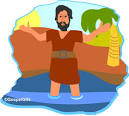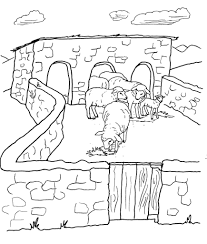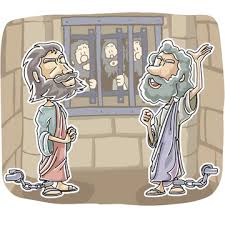John 11:9 – Jesus answered, "Are there not twelve hours in the day? If anyone walks in the day, he does not stumble, because he sees the light of this world."
Jesus has just announced to his disciples that they are going to leave the area beyond the Jordan and return to the house of Lazarus in Bethany. Because this puts them a mere two miles outside of Jerusalem, the disciples are concerned that the hostile Jewish leaders will try to kill them again. They question the decision of Jesus to put himself (and them) in harm's way.
 Jesus answers their concerns by using a comparison between Day and Night.
Jesus answers their concerns by using a comparison between Day and Night.If a man sets out on a journey (like the one they are about to take), he would naturally set out during the daytime. This way, he is sure to see any dangers that lie in his path. It is very unlikely that he will stumble or fall, because he can see the ground clearly. He would walk in confidence and his progress would be swift.
The same truth applies in the spiritual realm. God has prepared a special plan for each one of us. When we walk by his Spirit, going where he leads/commands, we are walking in the light of his wisdom, grace and protection. We do not need to fear (Psalms 56:11).
Psalm 119:105 - Your word is a lamp unto my feet, and a light unto my path.
There is no doubt that when we tread the paths of God our enemy Satan will put many obstacles, pitfalls and temptations in our way. However, we can boldly and confidently pursue our journey, and safely navigate around the traps of the enemy, because the Spirit illuminates our way. He leads us to victory.
John 11:10 – "But if anyone walks in the night he stumbles, because the light is not in him."
By contrast, it would be unnatural for a man to set out on a walking journey during the dead of night (remember, there were no street lights back in that day). By walking in the darkness, he greatly increases his chances of stumbling and falling over obstacles. He could seriously hurt himself or lose his way. His progress would be very slow and tedious.
In the spiritual realm, those who allow themselves to be guided by their own ideas and suggestions, disregarding the leading of the Spirit, are walking in the dark:
Proverbs 16:25 - There is a way that seems right unto a man, but the end thereof are the ways of death.
They become an easy target for the enemy who is prowling around seeking anyone he can catch off guard and devour (I Peter 5:8).
Thus, the disciples do not need to fear going to Bethany (or any other place), as long as they go where the Spirit leads. The same is true for you and me. Where is God leading you to go? What is he calling you to do next? Don't be afraid to take that first step of faith; Holy Spirit will clearly mark your path for you, and show you any traps/pitfalls the enemy has laid.
John 11:11 – After saying these things, he said to them, "Our friend Lazarus has fallen asleep, but I go to awaken him."
Jesus uses the term 'fallen asleep' to mean physical death. This is a euphemism that is frequently used in scripture to describe the death of the saints/children of God (Matthew 9:24, I Corinthians 15:51, I Thessalonians 5:10, Acts 7:60, Deuteronomy 31:16, etc).
This was very common saying among all the Jews. They often spoke of 'falling asleep' or 'sleeping with the fathers' to describe death. In fact, it is kind of surprising that the disciples did not get Jesus' meaning right away.
 The term 'sleep' is good because it removes all of the fear and ugliness associated with death. Instead, it reassures the reader by calling to mind the idea of calm rest after a life of turmoil. It also indicates that physical death is not final. For each saint who dies, there will eventually be an awakening or a resurrection to eternal life. Hallelujah!
The term 'sleep' is good because it removes all of the fear and ugliness associated with death. Instead, it reassures the reader by calling to mind the idea of calm rest after a life of turmoil. It also indicates that physical death is not final. For each saint who dies, there will eventually be an awakening or a resurrection to eternal life. Hallelujah! The fact that Jesus knows Lazarus is dead proves that he is God, for only God is omniscient (having universal knowledge; knowing all things). And while Jesus uses the group term 'our friend Lazarus', it is only he himself who can/will 'awaken' him from this sleep. I don't know about you, but I am glad that my own resurrection depends on Jesus' power and authority, not mine!
John 11:12-13 – The disciples said to him, "Lord, if he has fallen asleep, he will recover." Now Jesus had spoken of his death, but they thought that he meant taking rest in sleep.
The disciples understood the words of Jesus in a literal sense. Since they believed that sleep was beneficial for aiding in the recovery of sickness, they thought 'sleep' was a good thing.
According to their thinking, if Lazarus was sleeping he was past the crisis stage of his illness. Since he was on the way to a speedy recovery there was no real need for Jesus to put himself in danger by traveling to Bethany.
John 11:14-15 – Then Jesus told them plainly, "Lazarus has died, and for your sake I am glad that I was not there, so that you may believe. But let us go to him."
Jesus now bluntly informs the disciples that Lazarus is dead. We can take heart knowing that Jesus is always cognizant of the death of his saints. In fact, scripture tells us that God finds value in your physical death; it is actually precious in his sight (Psalms 116:15).
When it is your turn to cross over to the spiritual realm and leave this world behind, you can be sure that Jesus is aware of your coming and that he has prepared a place for you in his kingdom (John 14:2-3). He is looking forward to your arrival!
Ask yourself this question: Why do you suppose Jesus decided to go to the grave of Lazarus in person? After all, if Jesus is capable of healing at a distance (John 5:40), he could certainly resurrect at a distance too.
There are several good answers to this question:
- The purpose of the upcoming miracle was to glorify Jesus, to show people that he was really the divine Son of God, and prove that he had resurrection power. If he wasn't present, someone else may have taken credit for what transpired.
- Although Jesus was divine, he was also human. His very close friends were suffering greatly; it was natural for him to want to be close to them during this season of pain and suffering.
- If 'sleep' is an analogy for death, then man's awakening out of sleep is representative of his or her resurrection. Therefore it is imperative that Jesus be present, since he is the one who will raise us up at the last day with his resurrection power:
John 6:40 - And this is the will of him that sent me, that everyone who sees the Son, and believes on him, may have everlasting life: and I will raise him up at the last day.
In my opinion, this makes it all the more exciting that Jesus uses Lazarus' own name when he calls him forth from the grave. Although there is no biblical proof for it, I wonder if God will call each one of us by name on that great day when we rise to meet him in the air! Perhaps those who are asleep in the grave will hear his voice calling their name, just as Lazarus did!
Jesus makes another somewhat cryptic remark to the disciples – "...for your sake, I am glad that I was not there, so that you may believe."
What did Jesus mean by that?
Well, let's examine the situation. If Jesus had been present before Lazarus died, he would surely have healed him on the spot and thus prevented his death. While Lazarus' sisters and friends would have been happy and comforted, it would have done nothing for the faith of the disciples (or the unbelievers present at the funeral). They had seen Jesus heal hundreds of people already; this would be no different.
But if Jesus raises Lazarus from the death, it not only glorifies God (as we will examine later), it offers a stunning example of the power of Christ to the disciples. If Jesus can raise Lazarus from the dead, then he is also capable of raising them from the grave at the end of the age. Thus, their faith is greatly strengthened – and they were going to need that faith, as most of them died a martyr's death.
 It is comforting to once again see that Jesus uniquely equips each one of us for the race we will run in this life. He stretches and grows our faith so that we are victorious in life.
It is comforting to once again see that Jesus uniquely equips each one of us for the race we will run in this life. He stretches and grows our faith so that we are victorious in life.Jesus ends by saying 'Let us go to him', which is an interesting choice of words. Most of us would have said, 'Let us go to Mary and Martha, so we can comfort them'. This verse shows us that Jesus knew full well what was about to take place. He is in control of the situation.
Let me repeat that: Jesus was in complete control of the situation. It may not have seemed that way to the disciples or to Mary and Martha, but it was true nonetheless. In the same way, Jesus is in complete control of the events of your life as well – and that is a comforting thought!
It is also comforting to note that while death separates us from all of our family and friends, it can never separate us from God. In fact, it does the opposite – it ushers us into his presence.
John 11:16 – So Thomas, called the Twin, said to his fellow disciples, "Let us also go, that we may die with him."
Thomas is sometimes called "Didymus". Both names mean the same thing (twin); one word is Hebrew while the other is Greek. The obvious assumption is that Thomas had a twin.
In this situation, Thomas is encouraging his colleagues to stand firm and be willing to die with 'him'. There is some debate over who Thomas was referring to.
- Some say he was referring to Lazarus. In this scenario, the meaning is that Lazarus was already dead and if the disciples dared to show their faces so close to Jerusalem, they would shortly be dead too.
- Others believe Thomas was referring to Jesus. In this scenario, Thomas is encouraging his fellow disciples to stand firm in the command they received from Jesus – 'follow me' – even if it meant being stoned by the Jews alongside Christ.
In either case, Thomas once again shows a lack of faith. Instead of believing that he was walking according to the wisdom of Holy Spirit (walking in the light/day), he seems to be sure that he is going to die in Bethany.
While Thomas's faith was certainly not perfect (John 14:5, John 20:25), he was obviously committed to Jesus and his cause; he was willing to die for it. This was a great encouragement to his fellow disciples.
John 11:17-19 – Now when Jesus came, he found that Lazarus had already been in the tomb four days. Bethany was near Jerusalem, about two miles off and many of the Jews had come to Martha and Mary to console them concerning their brother.
As we already noted, Jesus purposely delayed coming to Bethany. At the time of his arrival, Lazarus had been dead for quite some time. Although the scriptures record other people being raised from the dead, none were gone as long as Lazarus was. His body had started to decay by that time. This delay served to make the miracle of resurrection an even more striking demonstration of the power of God.
So, what were the funeral arrangements?
Once the person died, the oldest son or the nearest relative present would close the eyes of the deceased. The mouth was also closed, bound up and covered. The death is announced by loud shrill wailing. The deceased was then placed in the tomb within 24 hours, which means there was no time for embalming.

Kings and prophets were generally buried within the city, while more common people (like Lazarus) were buried outside the city limits in grottoes or caves. While some of the burial chambers were natural caves, others were simply hewn out of rock. Multiple people were buried in separate chambers inside each cave. Graves were generally closed with stones and whitewashed, so people did not make themselves unclean by stumbling upon them.
The typical time of mourning for both Jews and Gentiles was seven days. During this time people visited Mary and Martha to offer condolences and to comfort them in their loss. The number of people coming and going was probably quite large. In addition to local family and friends, there were no doubt people from Jerusalem, as Bethany was only two miles away. While there were many common people, the crowd included influential/prominent citizens as well.
Although the intent of the mourners was to console the family, God had an additional purpose in mind for their visit – they were going to be witnesses to the mighty power of God.
It was very important for God to provide influential and impartial witnesses in the crowd, so that the jealous Pharisees did not try to claim this miracle was a collusion between Jesus and his friends. While the religious leaders could scoff at the testimony of the common people, the miracle would be hard to deny when Jerusalem's most prominent citizens witnessed it as well.
John 11:20 – So when Martha heard that Jesus was coming, she went and met him, but Mary remained seated in the house.
When word reaches Martha that Jesus has arrived in town, she does not waste any time running out to meet him. This seems to be typical of her character; she had a high level of energy/activity (Luke 10:38-42).
What was her motivation for running to see him before he arrived at the house?
- Some scholars feel that she went to give him an urgent word of warning that there were hostile Jews from Jerusalem present in the house.
- Others feel that she rushed out to give Christ an affectionate welcome because he was a close and honored friend of the entire family.
- Still others feel that she wanted a private audience with Jesus, to ask why he did not come sooner.
Mary, on the other hand, remained in the house, possibly in an inner room. This too, seems in character; scripture portrays her as calm and placid. She is described as 'sitting' in the house. Sitting on or near the ground was a common form of mourning back then. It reflected an attitude of extreme sorrow or distress in which grief had rendered the mourner immovable or unable to stand. It was common for all of the visiting mourners to sit down and remain beside the grieving family member.
John 11:21 – Martha said to Jesus, "Lord, if you had been here, my brother would not have died."
The words that Martha first speaks to Jesus outside of town are the exact same words her sister speaks to Jesus later on (verse 32). Obviously, this is not a coincidence. The sisters must have spoken these same words to each other multiple times over the last few days. Martha's words reveal elements of both faith and unbelief.
 To begin with, her opening remarks reveal grief at the death of her brother but also some resentment towards Jesus for not arriving in time to save the day. This shows that Martha had a limited understanding of the power and divinity of Christ; she did not believe he could heal or resurrect from the dead unless he was physically present with the patient.
To begin with, her opening remarks reveal grief at the death of her brother but also some resentment towards Jesus for not arriving in time to save the day. This shows that Martha had a limited understanding of the power and divinity of Christ; she did not believe he could heal or resurrect from the dead unless he was physically present with the patient.
It also shows that she had a limited understanding of the plans and purposes of God. She thinks Jesus arrived too late, but she is wrong. The death and resurrection of Lazarus were both appointed by God at a specific time, for a specific purpose. Jesus never has been and never will be late – he is always right on time.
John 11:22 – "But even now I know that whatever you ask from God, God will give you."
Here we see Martha's faith, although it is weak. She believes (as they probably all did) that no one could be raised from the dead after such an extended period of death. So she doesn't even ask Jesus to resurrect him.
In fact, she doesn't even acknowledge Jesus as having the power to do so himself. She relies on his power of intercession – whatever he asks of God, God will do.
It will shortly be demonstrated that Jesus is not only the ultimate intercessor, but also that he has the power of life in himself.
You and I can take comfort in knowing that nothing has changed in the last couple thousand years. Jesus is still the ultimate intercessor. When we have a need or problem so great that we cannot articulate it before God, Holy Spirit will intercede for us at the throne of grace.
Romans 8:26 - Likewise the Spirit also helps our weakness: for we know not what we should pray for as we ought but the Spirit himself makes intercession for us with groanings which cannot be uttered.
And Jesus is still in the resurrection business. He can resurrect our bodies, our marriages/relationships, our finances, our physical/mental/emotional health and anything else in our lives that has died prematurely.
Let me offer you some encouragement:
In today's post we noted that Jesus equips each of his children for their own individual path in life. Since that is true, we should never complain when we are going through a trial or difficulty. We can be confident that God allows that situation in our life because it will result in our eternal good and his glory. It will also benefit others, when they hear our testimony of how God brought us through.
So if you are facing a difficulty today, be encouraged! It won't be for nothing; good will come from it. And be sure to testify about it, so that others can benefit too!
Let me offer you some relief:
Nothing about the death of Lazarus caught Jesus off guard. He knew exactly what was happening, and exactly what he was going to do – bring good out of that situation.
I don't know about you, but I will confess that I sometimes forget that in the midst of my everyday struggles. When you see a situation on the horizon that has the potential to cause harm to you and your family, it's easy to panic. It's hard to see how any good could possible come from it.
But if we stand firm in our faith, God will bring us through. And when we look back, we will see that he was right there with us, all along. He always keeps his promises!
Let me offer you some strength:
The enemy has fooled many of us into believing that death is the final authority. He wants you to believe that when something in your life dies (health, finances, relationships, etc) that no hope remains.
But that is not true. With God, nothing is impossible. Put yourself in his hands, just as Martha did. You will find that he works all things together for your good and his glory.













































